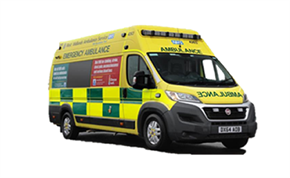
The Trust is now preparing to activate the Vehicle Closed Circuit Television (VCCTV) installed in all Fiat double-staffed ambulances.
The VCCTV technology has both forward and rear-view dashcams and is also equipped with interior video – only activated by the crew - to help ensure the safety of crews and patients.
The system passively records until activated by the crew, whereupon it actively records and includes the previous 10 minutes of footage.
This technology has not been activated while software and system protocols to protect the privacy of patients and staff have been put in place following discussions with the Trust’s unions and people.Now this is done the Trust is installing the hard drives that will make the system able to go live and training crews and managers to use the system.
What is the purpose of VCCTV?
VCCTV is not designed to monitor staff’s routine activity.
The camera in the clinical area is designed to deter violence and aggression against staff and to assist in the investigation of any such events - not to review clinical practice.
The interior camera footage is only viewable if a recording has been activated by the crew.
The imagery from the system will only be accessed to inform an investigation into an adverse event, or if a concern has been raised by an internal or external stakeholder.
All requests for access to the data held by the system will be authorised via a governed procedure to prevent misuse of the system in line with data protection law.
How will the system work?
The system is administrated and managed in line with the principle of Trust policy.
Only those who have been suitably authorised and trained to access the system will be permitted to do so.
Any person accessing the system shall be bound by Trust policy and national legislation relating to data protection.
If part of the system becomes inoperable, this must be reported immediately for investigation and resolution.
Activating recording
The system will operate while the ignition is switched on. Once the ignition is switched off completely, the external cameras will operate for 30 minutes and then shutdown.
The saloon camera passively records audio and video. On activation of the saloon emergency strip or the activation button in the cab, the system hard drive will write the passively recorded footage from 10 minutes prior to activation and continue to record until switched off.
The interior camera footage is only viewable if a recording has been activated by the crew.
Who can see the recordings?
Access to the system is protected by a password which meets the Trust’s security criteria. Access to VCCTV is limited to authorised members of staff who require to analyse data, as well as those responsible for the maintenance of the system.
Principally, this shall be the Driving Standards Manager and the Head of Health, Safety, and Security.
To access data, there must be a clear indication that the data is required as outlined in the policy.
The policy and procedures for activating VCCTV have been agreed following consultation with staff and union representatives.
Chief Executive Tom Abell said:
“I’m very pleased to have the support of staff and our union colleagues as we make this Vehicle CCTV system live across the Trust.
“This is a system which staff will be able to activate at need, and will create a safer working environment.
“We hope to see it have a deterrent effect on assaults and abuse against our staff and, in the event of incidents happening, provide evidence that will lead to more successful prosecutions.”
Please raise any questions with line management or with Gareth.lloyd@eastamb.nhs.uk
Published 13th April 2023